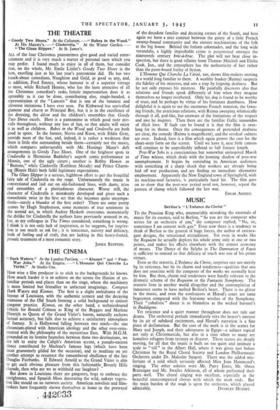THE THEATRE
Goody Two Shoes." At the Coliseum.—" Babes in the Wood." At His Majesty's.—" Cinderella." At the Winter Garden.— " The Glass Slipper." At St. James's.
ALL of the four Christmas pantomimes give good and varied enter- tainment and it is very much a matter of personal taste which you may prefer. I found much to enjoy in all of them, but consider that, on the whole, Mr. Emile Littler's Goody Two Shoes is the best, excelling just as his last year's pantomime did. He has two
knock-about comedians, Naughton and Gold, as good as any, and, in addition, Fred Emney, whose humour is of a superior vintage to most, while Richar21 Hearne, who has the least attractive of all the Christmas comedian's tasks, female impersonation does it as agreeably as it can be done, contributing also, single-handed, a representation of the "Lancers " that is one of the funniest and cleverest imitations I have ever seen. Pat Kirkwood has unrivalled glamour and charm as Principal Boy, but it is in the excellence of the dressing, the decor and the children's ensembles that Goody Two Shoes excels. Here is a pantomime in which good taste pre- vails throughout, without any loss of fun, so that adults will enjoy it as well as children. Babes in the Wood and Cinderella are both good in spots. In the former, Nervo and Knox, with Eddie Gray, provide most of the fun, and, indeed, it is rather a weakness that there is little else outstanding beside ihem—certainly not the music, which compares unfavourably with Mr. Hastings Mann's deft arrangements in Goody Two Shoes. One of the brightest spots in Cinderella is Hermione Baddeley's superb comic performance as Minnie, one of the ugly sisters ; another is Bobby Howes as "Buttons," while Cinderella (Kathleen Moody) and Prince Charm- ing (Binnie Hale) both fulfil legitimate expectations.
The Glass Slipper is a serious, highbrow effort to put the beautiful fairy tale of Cinderella on the stage. Unfortunately the music is conventional and laid out on old-fashioned lines, with duets, trios and ensembles of a platitudinous character. Worse still, the character of Cinderella is mistakenly developed and given such a masochistic twist in the first act that she becomes quite unsympa- thetic—surely a blunder of the first order? There are some pretty scenes by Hugh Stephenson, some moments of true sentiment in the second act, in which Audrey Hesketh overcomes momentarily the dislike for Cinderella the authors have previously aroused in us, tut, as my colleague in The Times considered, something is wrong. I think it is not only lack of inspiration, as he suggests, for inspira- tion is too much to ask for ; it is innocence, naivety and delicacy, both of feeling and of craft, that are lacking in this heavy-footed, prosaic treatment of a most romantic story.
JAMES REDFERN.


























 Previous page
Previous page